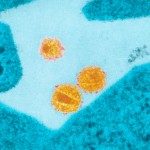Link to Pubmed [PMID] – 24865974
AIDS 2014 Jul;28(11):1593-602
OBJECTIVE: Patients coinfected with HIV and Mycobacterium tuberculosis frequently experience a paradoxical worsening of tuberculosis (TB) symptoms early after the initiation of combination antiretroviral therapy (cART). This immune reconstitution inflammatory syndrome (TB-IRIS) can lead to significant morbidity and needs to be distinguished from TB recurrence due to ineffective treatment. We investigated whether plasma biomarkers could predict the occurrence of TB-IRIS.
DESIGN: ANRS 129 BKVIR is a single-arm multicentre trial that enrolled 69 cART-naïve HIV-1-infected patients treated for TB. The patients received once-daily tenofovir/emtricitabine/efavirenz first-line regimen. TB-IRIS cases (IRIS+) were validated by an Event Review Committee.
METHODS: A panel of 26 plasma biomarkers was monitored longitudinally for 24 weeks from cART initiation onward, using multiplexed assays and high-sensitivity ELISA. Statistical analyses of biomarkers were adjusted for test multiplicity.
RESULTS: One-third of patients (n=23) experienced TB-IRIS. The inflammatory cytokines and chemokines interleukin (IL)-6, IL-8, interferon-gamma-induced protein 10 (IP-10), and tumour necrosis factor-alpha (TNF-α) showed increased plasma levels at week 4 in IRIS-positive (IRIS+) patients (P<0.05 for each biomarker). The soluble IL-2 receptor sCD25, which is released upon CD4 T-cell activation, was significantly increased at week 0 in IRIS+ patients (P<0.05), and remained elevated throughout follow-up. IL-7, a key homeostatic cytokine for CD4 T-cells, showed a trend for higher values in the TB-IRIS group. Both sCD25 and IL-7 baseline levels were independently associated with a shorter time to TB-IRIS occurrence (P=0.005 and P=0.02, respectively).
CONCLUSION: These findings support a role for CD4 T-cell activation prior to massive inflammation in the development of TB-IRIS.

